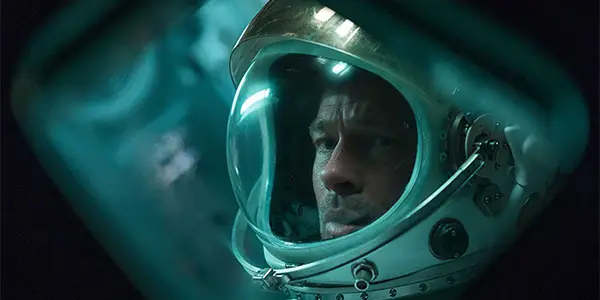As Neil Armstrong once stated, “Mystery creates wonder and wonder is the basis of man’s desire to understand.” James Gray is a filmmaker known for merging a minimalist atmosphere with a broad, ambitious scope, making epics out of quiet stories with his sweeping natural eye for grandeur. He follows up his 2016 film The Lost City of Z with Ad Astra, a science-fiction tour de force that follows Roy McBride (Brad Pitt), a Space Command Major who is informed that his father (Tommy Lee Jones), leader of a mission into the solar system dubbed the “Lima Project”, has been potentially found after almost two decades without contact. This dredges up past demons for McBride, a man so haunted by his father’s disappearance that he’s distanced himself from everyone else in the process.
Narrative Nuance Matched With Visual Splendor
A way I’ve attempted to describe the perplexing blend of style that Gray utilizes here is by separating it by two directors known for their visionary outlook on the seclusion and search for purpose in one’s own mind. Ad Astra acts as a quiet, tantalizing meditation on isolation in the outer reaches of our galaxy, and attempts to provoke a response to a few different questions. What inner demons can cause someone to potentially abandon all hope of returning to Earth? Is this event more focused on the leaving of something behind or the quest to search for something new out there?

These contribute to an overwhelmingly profound and moving experience. There’s been some hesitation over whether to even call this a science-fiction film or not because of how deeply it explores what’s inside of us instead of the furthest reaches of what’s outside. I personally have to disagree. Isn’t this what sci-fi is all about? Write a movie that just so happens to take place in space, you have fiction. But science isn’t just technology. It’s the way we perceive things, the way (in this case) the absence of someone can have an effect on one in a way that causes them to shut themselves away from the world around them.
Gray (who co-wrote the script with Ethan Gross) manages to convey this story in a reflective, humane way. He might know his audience’s emotions but never tries to manipulate them. For some, the emotional beats might not even come until hours after you’ve left the theater. That’s a testament to how talented Gray is at writing these characters in a way that comes across as completely natural. Even when his backdrop is the darkest reaches of the solar system, he’s able to analyze our desire for something seemingly unattainable in our own lives that would cause one to venture out so far.
Meditative But Muddled Themes
Over the decades, Brad Pitt has had a plethora of opportunities to showcase just how incredible he is at conveying a delicate but continually expansive range of emotion through his performances. He’s traversed dialogue-heavy period pieces (Inglorious Basterds) and dark satire (Fight Club), but Ad Astra gifts him his most quiet and contemplative work since The Tree of Life. The character of Roy McBride is a tormented one, and the script toys with the idea that outer space is a goal that just gets further and further away from us the more we try to grasp it. It’s only when we accept that the future we’ve been searching for might not come that we’re able to move on and repair the tears we’ve created with our present.
Hoyte Van Hoytema’s cinematography adds another layer to the vast atmosphere of the narrative. He’s previously done outstanding work for films such as Her, Interstellar, and Dunkirk, but his work here is just as entrancing and mesmerizing as it was in those previous outings. Every one of those added an introspective, spellbinding glimmer to their already nuanced stories, and Ad Astra continues that trend. Hoytema’s craft is jaw-dropping, a mythic concoction of peaceful and erratic energy that bounce off of one another and balance out the narrative.
However, there are points where the film becomes a smidge aimless. It seems as if Gray knew the vision he wanted to craft, but found it hard to fill in certain gaps in order to make it more complete. Some scenes are sufficient enough to contribute to the overall scope and narrative, but they ultimately come off as forgettable in certain respects. Even near the end, as the film draws to a close, it feels as if too much time was spent leading up to the climax and not enough during it. The themes resonate but aren’t nearly fully developed enough and land more upon reflection instead of during the actual viewing. Maybe upon rewatch this will change, but as for now, it’s hard to tell.
Ad Astra: Conclusion
Ad Astra is not without its flaws, but Gray’s science-fiction endeavor is ultimately one of the best films of the year. It’s a striking lunar voyage into the outermost reaches of the solar system that explores who we are and how others impact our lives in ways we might not be ready to admit. Pitt’s performance is melancholic and extraordinary, on a level we haven’t seen from him in a long time. Overall, it easily joins the roster of the best science-fiction films of the decade, among other masterpieces such as Blade Runner 2049 and Arrival. Shot beautifully by Hoyte Van Hoytema and featuring a stunningly cosmic score by Max Richter and Lorne Balfe, Ad Astra is one of the year’s most unforgettable cinematic journeys.
What is your favorite Brad Pitt performance? What about your favorite science-fiction film of this decade? Let us know in the comments.
Watch Ad Astra
Does content like this matter to you?
Become a Member and support film journalism. Unlock access to all of Film Inquiry`s great articles. Join a community of like-minded readers who are passionate about cinema - get access to our private members Network, give back to independent filmmakers, and more.